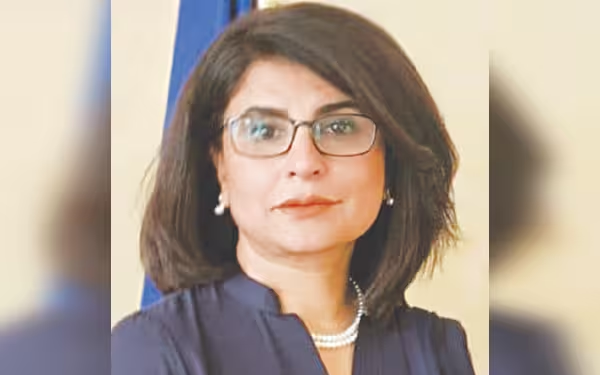Wednesday, January 15, 2025 07:42 AM
Amna Baloch Appointed As Pakistan's New Foreign Secretary
- Amna Baloch becomes first female foreign secretary from Sindh.
- Retired Lt Gen Mohammad Amir appointed ambassador to UAE.
- Mumtaz Zahra Baloch named ambassador to France.
 Image Credits: dawn
Image Credits: dawnAmna Baloch appointed as Pakistan's first female foreign secretary amid complex geopolitical challenges.
ISLAMABAD: The appointment of Ambassador Amna Baloch as the new foreign secretary of Pakistan marks a significant moment in the country’s diplomatic landscape. As she prepares to take on this crucial role, she is stepping into a complex web of geopolitical challenges and bureaucratic hurdles. Approved by Prime Minister Shehbaz Sharif, her appointment comes at a time when Pakistan's foreign relations are under intense scrutiny.
Amna Baloch, who was the second senior-most officer in the Foreign Service, will succeed Syrus Sajjad Qazi, who is set to retire on September 10. Baloch's previous experience as the ambassador to the European Union, Belgium, and Luxembourg, along with her role as high commissioner to Malaysia, positions her well for this new challenge. Notably, she will be the first woman from Sindh to hold the position of foreign secretary, a milestone that reflects the evolving landscape of leadership in Pakistan.
In a surprising twist, the government has appointed retired Lt Gen Mohammad Amir as the new ambassador to the UAE. This decision has sparked speculation regarding the motivations behind it. Some insiders suggest that Amir's close ties to former President Asif Ali Zardari, who has vested interests in the UAE, may have influenced this choice. Others believe that the military's desire to place one of their own in a key position is a strategic move, especially with anticipated investments from the UAE into Pakistan.
It is well-known that retired army officers often play a significant role in ambassadorial appointments, with a portion of these positions reserved for political appointees. Traditionally, these officers have been assigned to countries like Nigeria, Jordan, and Sri Lanka. However, recent trends indicate a shift towards the Middle East, with Abu Dhabi now being a focal point for such postings.
Meanwhile, the Foreign Office has designated Mumtaz Zahra Baloch as the ambassador to France, replacing Ambassador Asim Iftikhar, who will take on a new role at the United Nations in New York. This reshuffling of diplomatic positions highlights the dynamic nature of Pakistan's foreign relations.
As Amna Baloch steps into her role, she will face unique challenges, particularly in navigating the complexities of Pakistan's relationship with India, especially in light of Prime Minister Narendra Modi's re-election. The ongoing tensions in Kashmir will require a careful approach to diplomacy. Additionally, the situation in Bangladesh presents both challenges and opportunities, while the Iran-Israel conflict poses risks to the stability of the Middle East, a region vital for Pakistan's energy security and remittances.
Moreover, the deepening economic crisis in Pakistan necessitates a delicate balancing act to attract essential investments and maintain stable trade relations with key partners, including China and the Gulf states. Amna Baloch's predecessor, Syrus Sajjad Qazi, had a promising start but ultimately left office without significant achievements, which adds pressure on Baloch to deliver results.
As Ambassador Amna Baloch prepares to take the reins as foreign secretary, she stands at a crossroads of opportunity and challenge. Her success will depend on her ability to navigate the intricate landscape of international relations while addressing the pressing needs of Pakistan. The coming months will be crucial in determining how effectively she can steer the country through these turbulent times, and her performance will undoubtedly shape the future of Pakistan's foreign policy.













